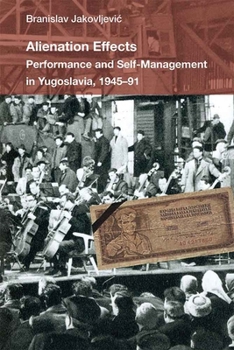Alienation Effects: Performance and Self-Management in Yugoslavia, 1945-91
In the 1970s, Yugoslavia emerged as a dynamic environment for conceptual and performance art. At the same time, it pursued its own form of political economy of socialist self-management. Alienation Effects argues that a deep relationship existed between the democratization of the arts and industrial democracy, resulting in a culture difficult to classify. The book challenges the assumption that the art emerging in Eastern Europe before 1989 was either "official" or "dissident" art; and shows thatthe break up of Yugoslavia was not a result of "ancient hatreds" among its peoples but instead came from the distortion and defeat of the idea of self-management. The case studies include mass performances organized during state holidays; proto-performance art, such as the 1954 production of Waiting for Godot in a former concentration camp in Belgrade; student demonstrations in 1968; and body art pieces by Gina Pane, Joseph Beuys, Marina Abramovic, and others. Alienation Effects sheds new light on the work of well-known artists and scholars, including early experimental poetry by Slavoj Zizek, as well as performance and conceptual artists that deserve wider, international attention.
Format:Paperback
Language:English
ISBN:0472053140
ISBN13:9780472053148
Release Date:June 2016
Publisher:University of Michigan Press
Length:382 Pages
Weight:1.35 lbs.
Dimensions:1.3" x 6.0" x 8.8"
Customer Reviews
0 rating





